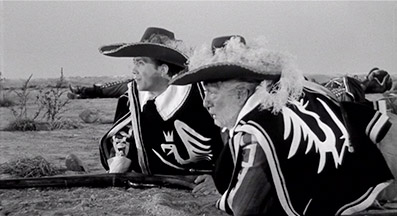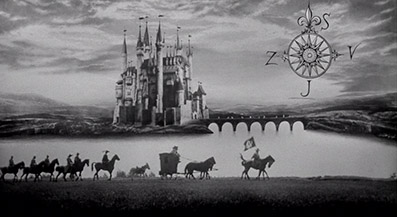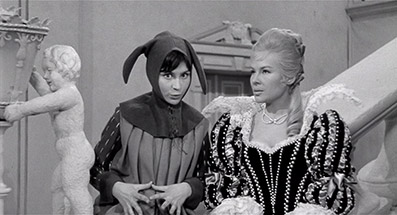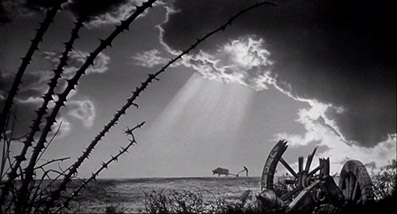|
If you've been afflicted with the unfortunate conviction that an historical comedy made in Czechoslovakia during the 1960s cannot possibly be funny, then Karel Zeman's A Jester's Tale [Bláznova kronika] is just the medicine you need. A film that had me grinning almost continuously and intermittently laughing out loud, I was hooked from the jauntily designed opening credits, which unfold to the sort of rousing, patriotic-sounding East European march-to-war song that always makes me want to drink beer from flagons and join a revolution. Even this doesn't prepare you for what then unfolds, or perhaps more specifically how it unfolds.
But before we get to that, let's talk about the story. True to its title, the tale is told by an ageing castle jester, whom we first encounter doing battle with a leaky pen in his attempt to write the story down in one of those large and unwieldy books that monks always seem to be authoring in films. Set in the 17th century during the Thirty Years War, it tells the story of a handsome ploughman named Petr, who is press-ganged into joining the King's army. He quickly escapes (how he does so is fun), but rides straight into enemy territory, where he is grabbed by Emperor Ferdinand's men and forcibly enlisted as a musketeer. A short while later he's unexpectedly joined by Matej, the older recruiting soldier from whom he escaped, a man who, in a blink of two match cuts, is able to switch uniforms and enlist in the army of the opposing side.

Right from the start it's clear that Petr is not cut out to be a model soldier. Instead of standing to attention while on parade, he bends down to pick a flower that catches his eye. "It's a forget-me-not," he informs his commander as he hands it to him like a young romantic wooing a potential bride-to-be. A few seconds later, he and his new comrades are out on the battlefield and marching abreast in a long line to stand off against the enemy. And wouldn't you know it, the very point at which the line is ordered to halt plonks Petr on small pile of rocks where, in an hilarious piece of deadpan physical comedy, he repeatedly struggles to stay on his feet, then manages to break his musket rest in half. As the musketeers prepare to fire, Petr has to drop to his knees to take aim. Matej crouches down alongside to reproach him, and when both sides start shooting they are the only two who escape the subsequent slaughter.
Following the battle, the opportunistic Matej loads up a cart with the spoils of war and the pair make their way across the barren countryside, on the way picking up pretty peasant girl Lenka, whose donkey they have unknowingly recruited to pull their cart. When Matej spies soldiers from the King's army approaching, the two men hastily don Royalist uniforms, while Lenka slips into a jester's costume. But Matej's eyesight is not what it once was, and the three are captured instead by the Emperor's men and imprisoned in the dungeon of a castle presided over by the Countess Veronika, a painting of whom Petr was earlier entranced by. But the tide of the war is ever changing, and with Petr mistaken for a Royalist nobleman and attracting the attention of the Countess, the fate of the hapless trio is far from set.

OK, that's it. We can't go any further without talking about the extraordinary manner in which Zeman tells his enormously entertaining tale. First, a confession. Despite the high regard in which the work of Karel Zeman is held and his influence on later filmmakers whose work I hold in high esteem, A Jester's Tale is the first Zeman film I have had the good fortune to see. In my defence, I would suggest that I'm far from alone – at the time of writing, the only five external reviews on this film's IMDb page are all of the DVD under examination here. And the timing of this release (due to circumstances beyond my control, I am hopelessly late with this review) makes it the second punch in a film history double-whammy. Released just a week after Arrow Academy's superb Walerian Borowczyk Short Films and Animation Blu-ray presented us with one of the key influences on Terry Gilliam's animated work for Monty Python, along comes a feature that was clearly every bit as inspirational. Using what appear to be authentic historical engravings and lithographic drawings, Zeman employs the same 2D cut-out technique that Gilliam would later make his own, and moves between live action, animation and even model work so smoothly that they feel organically wedded to each other. He even places his actors inside of drawn locations without a trace of how the effect was so perfectly realised.
Co-written by Zeman with Pavel Juráček, who was also responsible for the screenplay for Jindřich Polák's splendid 1963 Czech science fiction drama Ikarie XB 1, the film grounds its story in historical fact and then has blackly comic fun with Petr's ever-changing situation, as a timely battle victory sees his status switch in a heartbeat from chained-up prisoner to honoured guest. Barely pausing for breath, Zeman uses this as a springboard for consistently smart and sometimes barbed critique of war, which he delivers with the pace, gusto and devilish wit of a cheerful crusader armed with only a camera and a surplus of energy and imagination.

Even if you put the satirical digs aside (and why on Earth would you?), A Jester's Tale still delights as consistently lively character-driven comedy. Zeman's eye for the surreal and talent for physical humour give rise to a whole barrage of deliciously realised scenes, from the horseback messenger who cannot stop bouncing even after he dismounts, to the moment when Matej's drunken hallucinations are externalised as a hiccup with the power to topple buildings. Petr's take-on-all-comers sword fights are choreographed and staged with the energy and invention of top flight Douglas Fairbanks, while the sequence in which he attempts to escape the castle guards by climbing in through the Countess Veronika's bedroom window and is then asked to wait outside on the ladder while she makes herself up to be suitably seductive, has all the elements of a full blown farce.
If there's a dull moment anywhere in A Jester's Tale then I must have blinked and missed it, and it's a rare thing indeed to encounter a film that is able to maintain this level of energy, creativity and humour from its opening credits to its lively finale without anything even approximating a lull. Gorgeously shot by Václav Huňka and driven along by a gloriously good Jan Nivák score, it really is a joy, and a more accessible and audience-friendly introduction to the many and varied pleasures of the Czech New Wave you'll be pushed to find.
Second Run are one of the few UK DVD distributors who are still not putting out any of their titles on Blu-ray, but given the consistently quality high quality of their SD transfers, no-one I know seems to be the least bit concerned. Framed 1.85:1 and anamorphically enhanced, the image quality here is easily up to the label's usual standards, with the live action material in particular boasting an impressive tonal range and well-balanced contrast that delivers strong black levels without swallowing up darker picture information. There are some occasional small burn-outs on the highlights (which may well be endemic to the source material), but skin tones look lovely, and the crispness of the detail is particularly good for a DVD. There are still a fair few dust spots and the odd scratch, although never enough to prove distracting, and just occasionally you are made aware of the reel changes, but on the whole this is an excellent job.

The Dolby 2.0 mono soundtrack has the expected treble bias and lack of bass, but is otherwise clear and free of damage, and there is only a very slight background hiss that the film rarely sits still long enough for you to hear.
The English subtitles are clear and can be switched off if you know your way around the Czech language.
None on the disc, but included in the package is a Booklet containing an essay by Ian Haydn Smith entitled Possible Worlds: The Cinema of Karel Zeman, which provides a most informative introduction to the filmmaker and his work, A Jester's Tale included.
In case I've not made myself perfectly clear, I absolutely adored A Jester's Tale, to the extent that hunting out more of Karel Zeman's work has now become my number one priority. A delight both as a satire and as a blackly comic entertainment, it's brimming with invention and so deft in its technical sophistication that you need a second viewing to really appreciate the skill that has gone into staging what you have just enjoyed. There's only one extra in the DVD package, but the transfer is strong and the film itself more than justifies the asking price. Highly recommended.
|